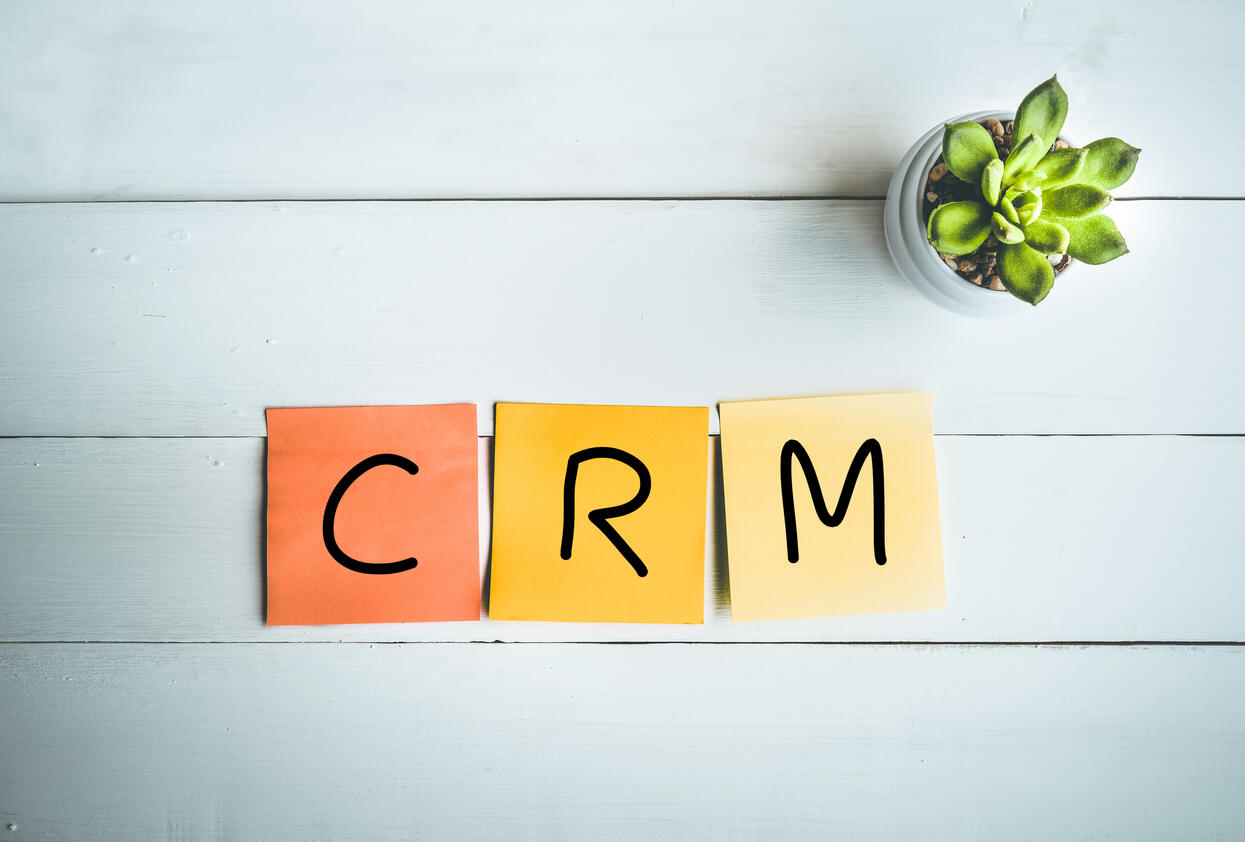Choosing CRM software is difficult with all of the options available. Compare features of the best CRM tools of 2021.

Image: iStock/HAKINMHAN
For many businesses, customer data is the lifeblood of their organization. Customer relationship management (CRM) software organizes that information into a single console, making it easy to access and search to find what you need. Modern CRM software, however, offers much more than just a digital Rolodex. The best CRM tools make it easier to connect with your customers and build their loyalty.
To help you find the best CRM software for your organization, we’ve put together this guide so you can determine the features and considerations that are most important for your business.
SEE: Hiring Kit: CRM Developer (TechRepublic Premium)
Common features of CRM software
The CRM software market is expected to reach $113.46 billion by 2027, according to Fortune Business Insights. This means there is an endless list of CRM vendors competing for your business, and it can sometimes be difficult to feel confident picking the right one for you. The best CRM software options will include these core features.
Contact and lead management
Contact and lead management is perhaps the most fundamental component of any CRM platform. After all, if you can’t store, monitor, and organize your customer data in a way that helps you drive sales and increase customer retention, what’s the point? Choose a CRM that matches your current workflow and sales process, especially if you have a highly complicated or specialized funnel that may require custom fields.
From a sales perspective, the most effective CRM solutions leverage artificial intelligence for predictive lead scoring, so you and your team can prioritize the leads that are most likely to convert to customers. Contact management is helpful for customer service as well. This feature allows you to store notes about all of the interactions you have with each customer, so everyone on your team is on the same page. It will also help you personalize future interactions and deliver consistently excellent customer service.
Here are two of the top CRM tools for lead management:
-
Zoho CRM includes an artificial intelligence feature, called Zia, that helps predict conversion probability. This helps sales teams prioritize the leads that are most likely to become customers. You can also customize the lead source options, so you know exactly which marketing campaigns are the most lucrative and which channels have room for improvement. From there, Zoho allows you to assign leads to your sales team based on lead location, line of business, or round robin distribution.
-
Insightly enables users to create an automated workflow for new leads based on custom criteria. Not only does this save time by reducing repetitive tasks, it also helps ensure no lead slips through the cracks. In addition to the pipeline status, Insightly associates a lead/contact record with all of its respective opportunities, projects, organization, and communication history, so all of the need-to-know information about a prospect is at the ready.
Cloud-based deployment
As opposed to a traditional on-premises CRM software, cloud-based CRM products are much easier to install and configure. The cloud-based model makes it possible to access the software from anywhere with an internet connection since it’s hosted on a remote server. This also means you won’t need to worry about upgrades or other maintenance requirements.
The cost of cloud-based CRM products is spread out over time rather than requiring a hefty capital investment like traditional deployments. Most vendors also offer a scalable pricing structure, so you only pay for the features, users, or capacity you need at any given time and can add more as your business grows.
Here are two of the top cloud-based CRM tools:
-
Salesforce is one of the biggest names in the CRM market. The cloud delivery model means Salesforce is exceptionally customizable depending on what features and integrations you need. For example, users can start with the Sales Cloud to manage prospects and drive revenue goals, then add the Marketing Cloud and Service Cloud down the road to streamline those efforts. Additionally, it’s easy to add more Salesforce seats as internal teams scale alongside the business.
-
Freshworks CRM requires minimal onboarding, which means it can be set up and put to use very quickly. This is great for fast-paced sales environments. Similarly, the cloud foundation means a rapidly growing business can easily move from one Freshworks tier to another as it requires more users, capacity, or features. Or, users can purchase optional add-ons to extend functionality for a specific need like conversion rate optimization, WhatsApp integration, and quote generation. This customization and flexibility would not be possible with a traditional, on-premises CRM deployment.
SEE: Hiring Kit: Salesforce Developer (TechRepublic Premium)
Marketing automation
CRM software with built-in marketing automation tools simplify your customer communication strategy. Using customer segmentation, you can target your messaging according to different stages of the sales funnel, customer type, industry, geographic location, or other custom segments. You can also track email open rates and link clicks, which are helpful for determining which marketing efforts are most valuable.
Automating email campaigns from the start will help you stay engaged with your customers without needing to send emails manually. This might look like an introduction series for new prospects or customers, or individual emails that are triggered when predetermined criteria are met. For example, when someone’s email address gets added to your contact list, you can use automation tools to enrich their customer profile. Once they take a specific action, your CRM can automatically send special offers or other compelling messages based on their purchase history and behaviors.
Here are two of the top CRM tools for marketing automation:
-
HubSpot is a robust platform for CRM, marketing, sales, and customer service. However, it’s evident that HubSpot was uniquely designed to drive sales through marketing automation. The inbound marketing tools aim to attract leads through email, social media, website content, display advertising, and similar channels; then, all of the data HubSpot collects is immediately visible to sales teams to nurture leads through the customer lifecycle. The best part is that many tools in the HubSpot suite are available for free with the option to upgrade for more functionality.
-
Drip, as the name suggests, is purpose-built for ecommerce drip campaigns. Its email builder helps create email campaigns that are visually engaging and targeted to a specific audience, thereby maximizing the likelihood that a customer will take action. Unlike other platforms, Drip includes support for multiple channels, including SMS, direct mail, and social media touchpoints. This helps businesses automate customer interactions from all angles while still maintaining a personalized approach.
Analytics and reporting
With all of the customer data CRM platforms contain, the solution you choose should provide you with valuable insight to inform your business decisions. However, basic cookie-cutter analytics and reporting might not be sufficient for your needs. A new leads report, for example, will provide relevant information about how many prospects you have and where they originated, but a losses report uses deeper analysis to determine possible roadblocks that prevent those prospects from converting to customers. Depending on your needs, you may also want to create custom reports based on your own filtering criteria.
Analytics and reporting might also take the form of forecasting tools, which are not as common across all CRM platforms. Forecasting uses your data to create a model for future sales growth, which ultimately benefits your ability to manage your supply chain and internal operations. It’s easy to make assumptions about what your future revenue will look like based on your gut instinct, but having accurate, comprehensive data to support those instincts is invaluable.
Here are two CRM tools with strong analytics and reporting capabilities:
-
Pipedrive was developed to drive sales for smaller teams with minimal tech experience. Its interface is very user-friendly, including the reporting features. The dashboards make it easy to visualize pipeline data and identify areas of strength and weakness. Similarly, the forecasting tool helps sales teams save time and resources by highlighting the opportunities that are most likely to close.
-
At its lowest price point, Vtiger offers a surprising number of customizable dashboards and reporting templates. All workflows on this platform are automated, which makes it easier to craft reports that hone in on specific characteristics, like a lead’s pipeline stage, the percentage of interactions for a marketing campaign, or a team member’s win rate.
CRM considerations by industry
Customer relationship management looks slightly different from one industry to another. Especially for healthcare, financial services, and real estate sectors, what you need from a CRM platform will largely depend on the type of relationship you have with your customers.
Healthcare CRM
In the healthcare industry, a CRM platform will make it easier to understand patient needs and patterns. It will take a lot of the administrative work out of managing a healthcare organization, so processes can run more efficiently. In turn, each patient receives the best care possible as quickly as possible.
The most effective healthcare CRM will run on multiple kinds of devices, including smartphones, tablets, and desktop computers. When a physician is with a patient, for example, they can reference relevant documents, add notes to the patient record, and schedule future appointments all from the same location. From a patient perspective, a CRM tool should provide a user-friendly self-service portal for managing appointments, accessing lab results, and paying healthcare costs. HIPAA compliance is also a major concern when dealing with patient information, so look for a solution that includes security controls for who is able to access the data and the actions they’re allowed to take.
Here are two prominent healthcare CRM vendors:
-
Kareo is built for independent practices rather than large clinics and hospitals. It combines electronic health records, practice management, patient engagement, billing, and marketing tools under one platform while also integrating with many of the common third-party apps medical professionals use. Kareo also offers free onboarding and training, so caregivers have the technical support they need to use the platform without wasting time worrying about troubleshooting.
-
Athenahealth seeks to remove silos from healthcare organizations so patient data can be used to improve overall health outcomes. It helps maximize productivity by streamlining administrative processes and enabling access to patient records from any device. Athenahealth helps medical offices stay ahead of the curve by offering support for medical decisions, care coordination, and emerging healthcare trends like telehealth.
SEE: Vendor access policy (TechRepublic Premium)
Financial services CRM
The days of being required to visit a financial institution in person to receive service are long gone. A CRM tool will create the personalized, digital-first experience to which customers have become accustomed while simultaneously providing a birds’ eye view of each customer profile to agents. It will also provide a way to capture valuable feedback to ensure customer needs are being met. Not only is this significant for customer experience, but it also helps agents navigate opportunities to grow their clients’ portfolios.
Additionally, a CRM should have features that simplify compliance requirements. The financial industry is regulated by strict legislation at the state and federal levels, so organizations must be prepared to comply with audits and investigations at any given time. This includes well-documented security measures like encryption and multi-factor authentication to protect customer data from unauthorized access. CRM software will also make it easier to manage contracts and comply with tax requirements.
Here are two financial services CRM solutions:
-
iPipeline is built on the Microsoft Dynamics CRM platform with additional features that are specifically tailored to the insurance and financial services industry. It digitizes many administrative processes, including policy administration, document processing, underwriting, and quote generation. iPipeline enriches the customer experience through customized self-service portals and simultaneously provides agents with the data they need to manage their clients’ accounts.
-
Redtail is a budget-friendly financial services CRM that helps strengthen client relationships and reduce attrition. It integrates with a wide range of common industry platforms and provides immediate data insight through straightforward dashboards and reports. This means agents can access their contacts, calendar, and relevant documents from the same platform. Redtail’s unique pricing structure also allows businesses to pay per database rather than per user, which is ideal for lean teams.
Real estate CRM
The real estate industry is unique because agents must manage leads from both ends—that is, people who are wanting to sell their homes as well as those who are looking to purchase. A CRM software simplifies the juggling process by automating email campaigns that match new listings with appropriate prospects once a new listing becomes available. The best solutions will also include integrations for social media management platforms as well, so all marketing efforts can tie back to an individual client’s status in the sales pipeline.
CRM applications save real estate agents time by identifying high-value clients who are most likely to act on available listings as well as those who are more interested in browsing listings at a leisurely pace. They will also help with appointment scheduling, geolocation mapping, and document management. Most importantly, CRM solutions with easy-to-use mobile applications make it possible to manage communication, contracts, and new opportunities while on the go—an absolute must-have in the fast-paced real estate market.
Here are two real estate CRM vendors to consider:
-
Propertybase helps agents, teams, and brokerages improve their productivity by centralizing leads and automating follow up with prospective buyers and sellers. Under one roof, it includes tools for CRM, marketing, back office management, and lead generation. This helps agents streamline the home buying process from listing to closing. Propertybase also integrates with most multiple listing services (MLS) like Zillow and BoldLeads so agents can automate drip campaigns and track listing performance from one place.
-
Juniper Square is geared toward commercial real estate investment managers, and includes a number of unique features to help manage investor relationships. This includes fundraising automation, investor reporting, and a self-service investor portal. Juniper Square also offers services for specific needs like accounting, reporting, and compliance so investment firms can streamline their operations.
Nonprofit CRM
Although nonprofit organizations use CRM software a bit differently than for-profit companies, it’s still a crucial part of managing constituents, donations, and community impact. Of course, marketing automation is helpful for fundraising pushes and advocacy work, but the wider scope of contact management helps identify and engage the most supportive donors, volunteers, and members. This personalized approach to donor management leads to larger, more frequent donations that make nonprofit work possible.
By creating customized dashboards and reports, nonprofit leaders can identify trends within their constituent profile. Do donations roll in at a higher volume during certain seasons? Which highly engaged members have felt compelled to become volunteers? How many recurring donations are active and from whom? This information is important for planning organization resources as well as creating opportunities to recognize the top contributors. This insight is less beneficial, however, if the CRM platform itself comes with too big of a price tag. Fortunately, there are numerous cost-effective options that still enable a high degree of customization.
Here are two CRM solutions for nonprofit organizations:
-
Kindful was built to help nonprofits with online fundraising, donor management, and dynamic reporting. Its widespread integrations centralize the applications that span an entire organization, like QuickBooks, Mailchimp, Eventbrite, and Shopify. It helps build deeper, more impactful donor relationships and minimizes the amount of administrative work that can waste valuable time.
-
Salsa helps engage constituents through multiple online and offline channels, including email, social media, and direct mail. It features a unique machine learning tool that helps automate future gift recommendations and collect deep insights about each donor. In addition to advocacy and peer-to-peer fundraising tools, Salsa’s SmartEngagement technology enables organizations to automate workflows to deepen supporter engagement and combat donor attrition.
Benefits of using CRM tools
The benefits of using CRM software are fairly universal, but small and medium-sized businesses will experience some benefits more significantly than a larger enterprise and vice-versa.
SMB benefits
For owners of small and medium-sized businesses, there are never enough hours in the day to get everything done. These organizations must reduce operating costs at every opportunity and keep budgets as lean as possible to maximize profitability. CRM software can help these companies strategically use their business resources by helping sales teams prioritize the most promising leads and deprioritize the least promising.
Automation and analytics capabilities also make SMBs more efficient and free up time to focus on other priorities. This helps propel sales opportunities and drive revenue goals, but it’s important that these features are easy to use and not overwhelming. Especially for lean teams who may not have as much technical expertise, the right CRM solution will have an intuitive interface with simple controls that easily integrate with existing workflows.
More features don’t always mean a specific product is better, and basic tools can still have a significant impact on an organization’s bottom line. The key is getting the right configuration from the beginning, so SMBs should look for vendors that offer accessible training, support, and documentation. These resources will ensure the software is working effectively and provide assistance if something goes wrong.
Here are two examples of CRM solutions created with SMBs in mind:
-
Nimble makes building a CRM easier because it builds itself for you. It automatically combines contacts from your email, social media connections, and calendar appointments into a single, unified console. This helps you skip long setup times and get to nurturing your relationships. Nimble also integrates with your social media profiles to meet your contacts where they are, and the browser extension provides actionable contact information on the fly.
-
Less Annoying CRM provides video tutorials and introductions to make setup and use as easy as possible. The software combines your team’s calendar and tasks with the CRM to keep everything organized in one place. To keep leads from slipping through the cracks, Less Annoying CRM provides an updated list of every lead in your pipeline, including their status and when they were last contacted. The web-based software is sleek, customizable, and available on-the-go.
Enterprise benefits
The clearest advantage of CRM software for large enterprises is the ability to glean deeper understanding from new and existing customer data. This insight often comes from customization options that are baked into a specific CRM platform, whether it’s the features themselves that are included or how those features are implemented. Profile fields, dashboards, reports, workflows, integrations, and automations can all be customized to meet the unique needs of an enterprise on a large scale. By enriching business decisions with comprehensive, up-to-the-minute data insights, leaders can feel confident that they have a reliable foundation for future planning.
CRM software also helps ensure sales, customer service, and marketing teams have access to all the relevant information they need, regardless of where they are physically located. Especially for companies with a distributed workforce, this is essential for maintaining quality service at all times. For example, a sales representative should be aware of all the interactions a contact has had with the customer service team so they can approach any future conversations with an appropriate tone. Trying to upsell an unhappy customer is usually a futile effort, but the context that a CRM provides can help turn a negative situation into a positive one.
Data backups and security are also of the utmost importance for large organizations with vast databases. As part of a broader disaster recovery plan, CRMs should provide tools for automatic backups that can be restored in the event of a data breach, natural disaster, or other instance of data loss. Likewise, a CRM’s security measures like password policy management, multi-factor authentication, and even biometric verification in highly sensitive situations will give an organization’s security team the controls necessary to manage user access.
Here are two enterprise-grade CRM solutions:
-
SAP CRM offers unique customer insights that allow you to proactively anticipate their needs. Use those insights to deliver personalized experiences and drive engagement from your contacts. With solutions for e-commerce, sales, customer support, and marketing, it’s easy to deploy SAP across your organization for cohesive lead management. The platform is customizable and scalable, allowing you to add and alter features to meet your needs.
-
Netsuite CRM is a cloud-based solution providing information on the entire customer lifecycle. In addition to standard CRM capabilities, Netsuite’s CRM also provides sales forecasting and integration with your e-commerce platform to make sure you’re hitting your goals. The platform helps improve sales performance in a variety of industries, including hospitality, retail, financial services, and consulting. Netsuite also offers highly-rated ERP, BI, and HCM tools that you can combine for a complete software suite.
Choosing the best CRM software for your organization
When it comes to CRM software, you know your needs better than anyone. Whether your business model requires specific features or you want to start small and scale as your business grows, there is a CRM product that will streamline your customer experience efforts and propel your business forward. Start by looking at vendors who built tools with your business’s industry or size in mind, then take advantage of free trials and live demonstrations to narrow down your search.
Author Kaiti Norton is a content writer for eSecurity Planet, Webopedia, and Small Business Computing.
Also see
Source of Article




